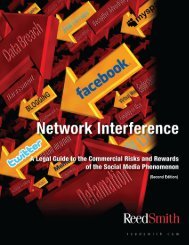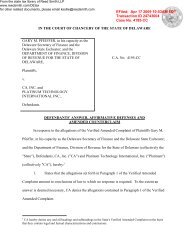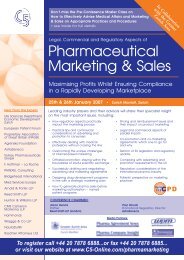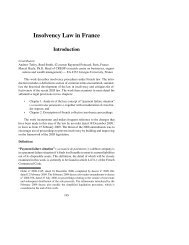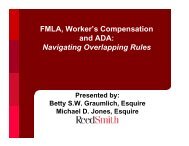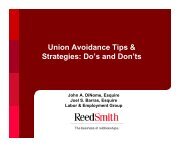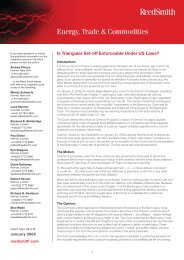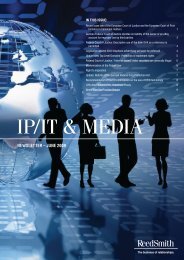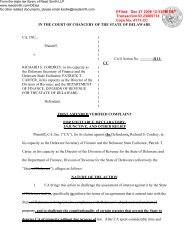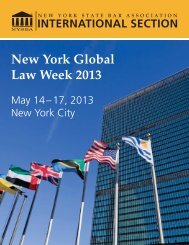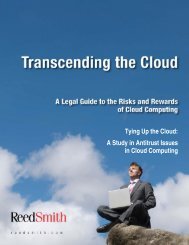Cloud Coverage - Reed Smith
Cloud Coverage - Reed Smith
Cloud Coverage - Reed Smith
Create successful ePaper yourself
Turn your PDF publications into a flip-book with our unique Google optimized e-Paper software.
Transcending the <strong>Cloud</strong> – A Legal Guide to the Risk and Rewards of <strong>Cloud</strong> Computing<br />
<strong>Cloud</strong> <strong>Coverage</strong><br />
Authors<br />
Richard P. Lewis, Partner – rlewis@reedsmith.com<br />
Carolyn H. Rosenberg, Partner – crosenberg@reedsmith.com<br />
Introduction<br />
Where clouds form, rain follows. Insurance should be there<br />
to protect you. This article outlines steps to consider so that<br />
coverage holds when the rain hits.<br />
<strong>Cloud</strong> Computing may create new risks and exposures,<br />
financially as well as reputationally. Traditional and more<br />
recent insurance coverage may come into play. On the<br />
traditional insurance front, property, and specifically<br />
business interruption coverage, may be a natural place to<br />
look. These policies are designed to cover first-party<br />
exposures—loss to business. Other coverage to consider<br />
for claims made by third parties against a company—by<br />
stockholders, consumers, the government or other<br />
entities—include commercial general liability (“CGL”),<br />
professional liability, director and officer liability,<br />
employment practices, and fiduciary liability policies. More<br />
recently, data privacy and security policies (sometimes<br />
called "cyber" policies) should be considered as well.<br />
First-Party <strong>Coverage</strong> Issues<br />
<strong>Cloud</strong> Computing Purchasers<br />
The primary first-party exposure is to <strong>Cloud</strong> Computing<br />
consumers, where some event impacts their data or ability<br />
to access that data, causing them to lose income. Is this<br />
lost Business Income covered under standard first-party<br />
policies providing Business Income, Contingent Business<br />
Income or Service Interruption coverage<br />
Business Income coverage is designed to cover a<br />
policyholder for loss of profits and unavoidable continuing<br />
expenses—“Business Income”—during the period business<br />
is affected by damage to property through which the<br />
policyholder conducts operations. Contingent Business<br />
Income coverage is designed to cover a policyholder for<br />
lost Business Income when damage to property through<br />
which a third party conducts operations prevents that third<br />
party from providing services to the policyholder. Service<br />
Interruption coverage is designed to cover a policyholder<br />
for lost Business Income when certain enumerated<br />
services provided to the policyholder are interrupted,<br />
typically by damage to off-site transmission or generation<br />
equipment. Because it is unclear whether any of these<br />
coverages, as typically drafted, would cover a <strong>Cloud</strong><br />
Computing consumer for lost Business Income from<br />
damage to, or inability to access, their data, new coverages<br />
will need to be drafted.<br />
As to Business Income coverage, note first that such<br />
coverage is typically restricted to damage to property at (or<br />
within 1000 feet of) the premises, and it seems likely that<br />
any damage to property causing a <strong>Cloud</strong> Computing<br />
interruption would not be located at the premises of the<br />
policyholder: indeed, one of the prime advantages of <strong>Cloud</strong><br />
Computing is that the “property” is off-site. It is hard to<br />
predict where damage to data would be deemed to have<br />
taken place. Indeed, courts may not consider data to be<br />
property, susceptible to damage, at all.1 Relatedly, courts<br />
may find that data that simply cannot be accessed has not<br />
been damaged. Most courts, however, find that property<br />
that cannot be used for its intended purpose has been<br />
damaged.2<br />
Because a claim based on the inability to access data as a<br />
result of problems of a <strong>Cloud</strong> Computing provider would<br />
likely involve data or equipment off-site, it would appear to<br />
fit more naturally as a Contingent Business Income claim.<br />
Again, however, the policyholder would have to prove that<br />
damage to property caused the interruption.<br />
<strong>Cloud</strong> <strong>Coverage</strong> 1



